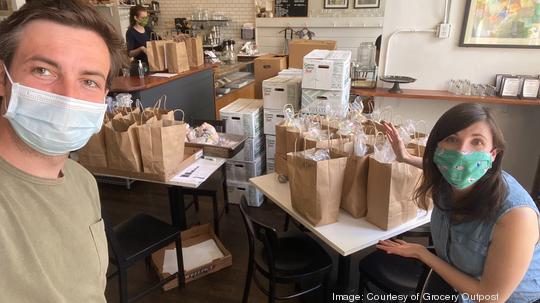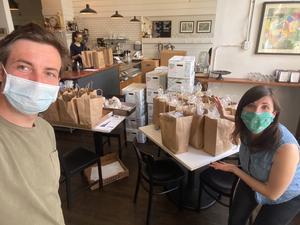
Seven months after Ethan Pierce and Emma Snyder launched a platform that enables restaurants to sell groceries locally, called Grocery Outpost, the pair is shutting the venture down.
Grocery Outpost launched in April after Pierce and Snyder both found themselves staring down the prospect of unemployment. Pierce had been working as a consultant with Techstars Boston teams that no longer had the runway to hire him, while Snyder was one of the more than 1,000 workers laid off from restaurant payments company Toast. The two quickly put their heads together to develop a solution that paired their technical expertise with Snyder's knowledge of the restaurant industry. The resulting venture was Grocery Outpost, which essentially set up restaurants as temporary grocery stores to help proprietors and their wholesale suppliers make up for lost revenue.
It was always possible that the project would be a short-lived operation. In April, Pierce told BostInno that "we'll figure out whether this is something that could help sustain restaurants long-term, create a secondary revenue stream for restaurants and become a business, but I think we're happy even if this is a shorter-term Covid-19 project." During its seven months of existence, though, Grocery Outpost picked up considerable steam.
By late August, the venture had expanded to 10 restaurant "outposts," serviced more than 500 households in Greater Boston, hired an account manager and brought in outside investment, with the goal of raising a pre-seed round. The team also planned to launch a membership program in September.
However, as Pierce outlined Wednesday in a refreshingly candid Medium post he entitled "Starting — and Closing — a Pandemic Venture," Grocery Outpost also hit several pain points as it grew.
"Ultimately, there were two challenges that we weren’t able to overcome as a team: 1) the instability of partners, caused by the second wave of the pandemic, and 2) human error," he wrote.
Grocery Outpost fundamentally relied on restaurants to stay in operation. As the pandemic has raged on into the winter — and with the close of outdoor dining in Boston, which had driven much of the restaurants' revenue — many of them limited their hours or closed altogether, going into "hibernation," Pierce wrote.
The "human error," meanwhile, was multi-pronged. New products and vendors introduced more room for error, both from vendors, who would deliver the wrong products, and from restaurant staff, who made "aggregation errors" that were costly to fix, Pierce wrote. The inconsistency lost Grocery Outpost customers.
The timing of the pandemic, which led to Grocery Outpost's existence in the first place, was what eventually sank the project.
"Is it possible that we could have resolved these problems with sufficient capital, technology, and time? Perhaps," Pierce wrote. "We’ve both gained incredibly valuable learnings from this venture that we will take with us, and nurture in new forms — but the timing isn’t right for us to continue pursuing this particular path."





